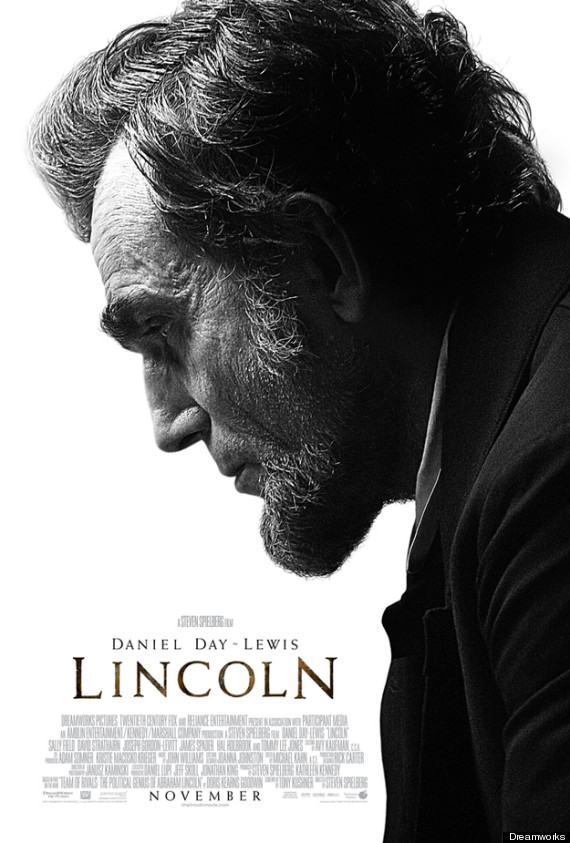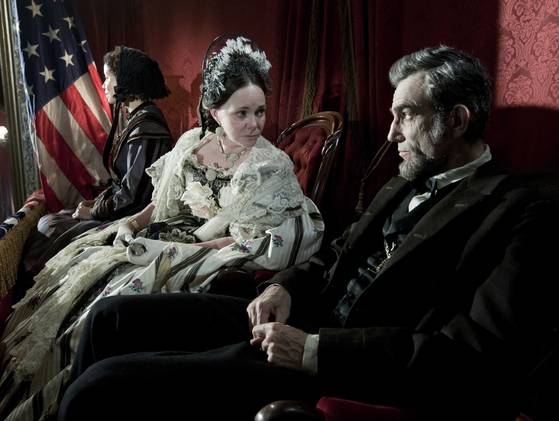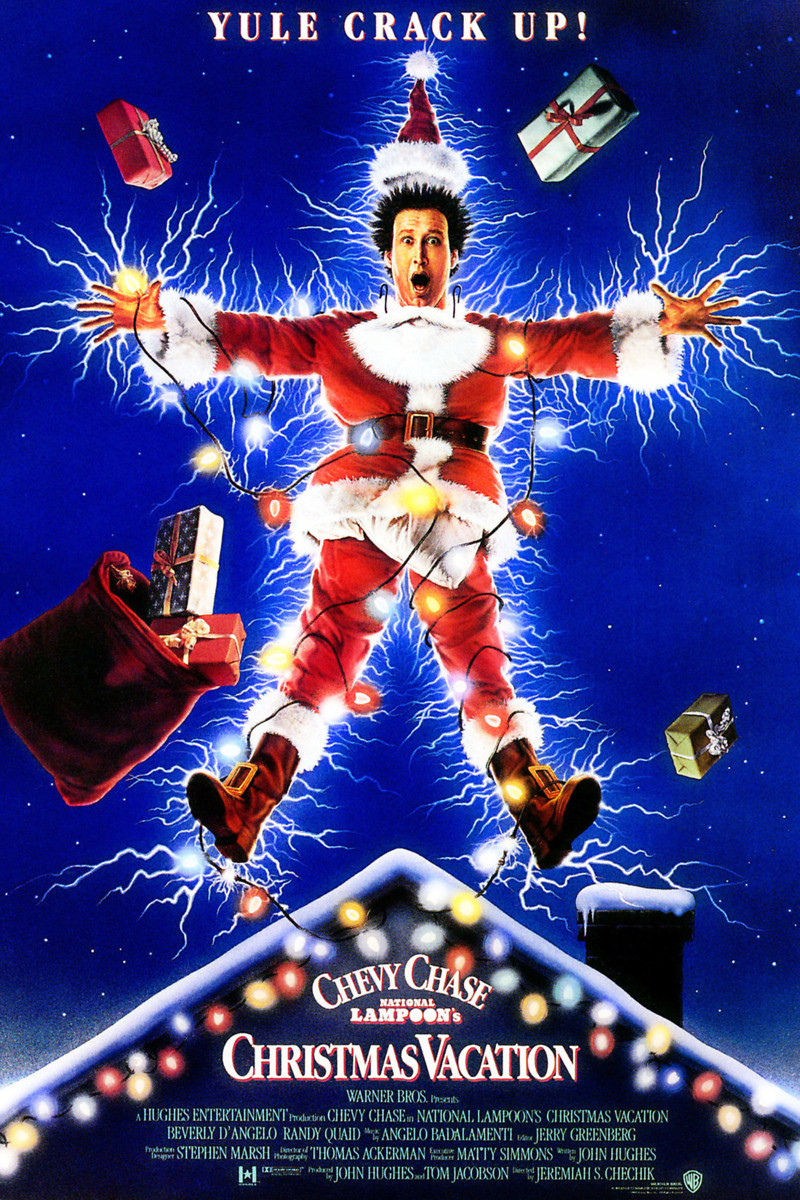

Director: Steven Spielberg, 2012 (PG-13)
A mark of a good film is that despite its length, it keeps our attention and we lose track of time. Lincoln is long, at 150 minutes but it feels shorter. It is certainly not too long, but it does have too many characters, and this causes some confusion as we try to understand who is who. With a star-studded cast, we can keep track of those we know, but most viewers will be hard pressed to keep straight all the various politicians here.
The film opens with a brutal battle scene. Union and Confederate soldiers fight hand to hand, bayonet-to-bayonet in the muddy field until most lay dead or dying, uniforms stained with blood and mud until they are all but indistinguishable. You can almost feel the inexorable march to death for these soldiers. Contrasted with this toward the end Spielberg shows the aftermath of battle in the only other bloody scene. Lincoln rides his horse slowly through a battle-field after the fighting is over. Carnage everywhere, bodies strewn about, the consequences of war stare starkly up at him. Not surprising, since the American Civil War was the bloodiest and deadliest in the history of American wars. Over the course of 4 years, an estimated 625,000 soldiers were killed, more than World Wars 1 and 2, Vietnam and Korean wars combined.
 Lincoln
Lincoln gives us not so much a historical biography of the 16
th President, but a snapshot of his life in the months after he was elected to a second term. The year is 1865, the Civil War has been waging for four years, and the country is tired of the fighting. Most want peace, but the South wants that at the price of slavery. Lincoln wants both: an end to the war and to slavery.
Spielberg retained the rights to the Doris Goodwin’s book, “Team of Rivals: The Political Genius of Abraham Lincoln”, and uses this to showcase the passion, character and commitment of the men in the oval office. Teaming up with Daniel Day-Lewis for the first time, he has his Lincoln down pat. Day-Lewis, an Oscar-winner for
There Will be Blood, inhabits the role until we forget this is an actor and think this is the real person, amazingly showing up on screen a century later. This stands as perhaps the best acting in 2012, and Day-Lewis clearly needs to make room in his trophy cabinet for another golden statuette, that will likely be his in February 2013. Alongside him, Sally Field is tremendous as his wife Mary Todd Lincoln. She shows the grieving neediness of the woman, but also the political savvy that the first woman needs to back up her husband. Together, they give us a glimpse into the tumultuous relationship the Lincolns had.
Despite the bloody opening scene, Spielberg has not made an action movie. Lincoln, in contrast, is a rather quiet and contemplative movie about the political machinations that led to the passing of the 13th Amendment to the Constitution that abolished slavery for good.
Spielberg uses the opening scene to provide context. He shows a war-weary Lincoln sitting, after the battle, listening and talking to Union soldiers, both black and white. They recite his Gettysburg address, perhaps the most famous of Lincoln’s speeches. This iconic rhetoric, with a mere 270 words, begins: “Four score and seven years ago our fathers brought forth on this continent a new nation, conceived in liberty, and dedicated to the proposition that all men are created equal.” And as one black soldier walks away, he utters part of the conclusion: “that we here highly resolve that these dead shall not have died in vain—that this nation, under God, shall have a new birth of freedom”. This sets the tone – Lincoln will have freedom from slavery before he has peace from battle.
Moreover, when Lincoln shares a dream with his wife that he is floating alone in a ship, she discerns that he thinking about the battle, not for peace, but for this freedom. It is a political battle. With the Republicans ready to support him, but the Democrats vigorously opposed there seems little hope for the 13th Amendment. The Democrats want the war to end, but if that happens the South will rejoin the United States and veto any attempt to abolish slavery. Lincoln understands the winds of the moment and realizes he must strike while the war is waging, even if it is waning. And the movie gives us this political battle.
With the help of his Secretary of State William Seward (David Strathairn), Lincoln undertakes a mission to gain the votes necessary to buy him victory in Congress, the Senate already having passed the amendment. He tells his cabinet, “I am the president of the United States of America clothed in immense power. You will get me those votes!” But to do so, he charges Seward with using three henchmen to buy the votes of weak, lame-duck Democrats. What might be considered lobbyists now, these are offering what would in almost any other circumstances be considered bribes.
This brings up the first ethical question: what price conviction? Lincoln is convinced that slavery must be abolished. Each man stands equal before God, who shows no favoritism (Gal. 2:6), and this must become true under American law also. But he is prepared to use tactics that are at least shady and that some might say reek of dishonesty. Was he right in taking such action? Clearly the end result was good and we live in a country that now upholds this amendment and allows all to viewed in equality. This highlights the grayness that encompasses politics. There is no black and white.
On the same front, Lincoln faced a tough issue at home. His eldest son Robert (Joseph Gordon-Levitt,
Looper) returned home from law school to announce his desire to join the army. If Lincoln continues his path forward on the amendment, the war will continue and the possibility of his son’s death increases. The price of his conviction is possibly the death of his son (does that sound familiar?).
Two of the most compelling scenes show Lincoln in the White House. In one, he sees his youngest son asleep on the floor before a dying fire. He gets down alongside him and gently kisses him. In the other, he is in the Oval Office and he gets onto his knees to use a poker to keep the fire going. He is a president who has not forgotten his background and who is not afraid of doing what is needed. Yet, he takes time with his family and wants the best for them, as he wants freedom for the slaves.

Stealing scenes, if that is possible, from Day-Lewis Tommy Lee Jones plays Pennsylvania Congressman Thaddeus Stevens. A Republican who has fought his whole life for the equality of blacks in all areas, Stevens finds himself put into a position toward the end of the film where he must choose between his convictions and his goals or dreams. He wants the amendment to pass, but is asked to compromise. And it is unclear even in the moment what he will do.
Here is the second question: what price compromise? Politics is by definition the art of compromise to work through grid-lock, even today. But can we sacrifice our convictions to achieve greater good? This is indeed a tough question and Jones communicates the gravity of the decision Stevens faces. Yet sometimes this is needed. Some would say most politicians lack convictions and character, but that is not always true. In this case, Stevens had to turn his back on what had espoused for three decades if he wanted to achieve permanent gain. And, as the film shows, he had a vested interest. He had skin in the game, so to speak.

The real question here, though is: what price freedom? As we all know by now, the 13
th Amendment was passed and came into law before the Civil War ended and before Lincoln was assassinated. But it cost Lincoln familial peace, and it probably cost him his life. He was prepared to sacrifice it all to achieve this goal. The Great Emancipator freed slaves across the Union and we will never go back to the hideous ownership of other human beings.
What a parallel with the price of true freedom. Human beings are born into sin (Rom. 5:12), and are bound into slavery to sin (Jn. 8:34, Rom. 6:16). We may not realize it, but the invisible shackles bind us nevertheless. Then our Great Emancipator and Redeemer Jesus Christ provided his own 13th amendment. This did not require political maneuverings and compromise. Rather, it simply required sacrifice (Acts 5:30). Jesus died on the cross, crucified on two rough wooden beams, so that we might be freed. He rescued us from the kingdom of darkness (Col. 1:13). As Paul states, “through Christ Jesus the law of the Spirit who gives life has set you free from the law of sin and death” (Rom. 8:2). What price our freedom?

Throughout the film, we see Lincoln walking somewhat stopped, shoulders down like he is carrying the weight of the world on his shoulders. The war and the battle for the 13
th Amendment carried a huge cost on this great American. Think about the actual weight of the world that Jesus Christ carried in his battle with Satan and his victory over slavery. We owe each a huge debt of gratitude. But only Jesus stands waiting for us to claim his victory and his freedom. Have you done that yet? Have you experienced this freedom from slavery? If not, the time is ripe!
Copyright ©2012, Martin Baggs


 Do we ever do this? Do we set unrealistic expectations? Some of us do. And when we do, we are setting ourselves and our families up for failure. We are dooming ourselves to disappointment. When we live in such a dreamland as Clark inhabits we crush our hopes and leave a trail of broken psyches in our wake. It is not worth it. We should choose to accept reality. We must lower the bar and allow for imperfection.
Do we ever do this? Do we set unrealistic expectations? Some of us do. And when we do, we are setting ourselves and our families up for failure. We are dooming ourselves to disappointment. When we live in such a dreamland as Clark inhabits we crush our hopes and leave a trail of broken psyches in our wake. It is not worth it. We should choose to accept reality. We must lower the bar and allow for imperfection. Along the way, Clark tries to hang enough lights to bring down the Chicago grid, sticks to things with sap-soaked fingers, gets surprised by his country-bumpkin cousin Eddie (Randy Quaid) and their appalling RV, and has to deal with cats, squirrels and nosy neighbors. Certainly it's over-the-top, but it's funny with tons of throw-away one-liners mostly from Clark like this one to Eddie, who has already over-stayed his welcome: "Can I refill your eggnog for you? Get you something to eat? Drive you out to the middle of nowhere and leave you for dead?"
Along the way, Clark tries to hang enough lights to bring down the Chicago grid, sticks to things with sap-soaked fingers, gets surprised by his country-bumpkin cousin Eddie (Randy Quaid) and their appalling RV, and has to deal with cats, squirrels and nosy neighbors. Certainly it's over-the-top, but it's funny with tons of throw-away one-liners mostly from Clark like this one to Eddie, who has already over-stayed his welcome: "Can I refill your eggnog for you? Get you something to eat? Drive you out to the middle of nowhere and leave you for dead?"







+copy.jpg)



